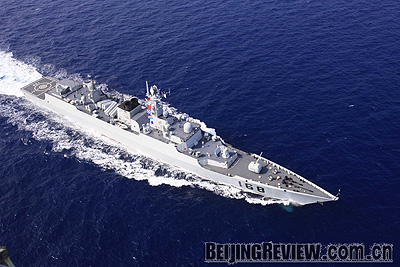|
When Chinese navigator Zheng He explored the deep blue ocean on a royal mission for the Ming Dynasty in the early 15th century, Chinese were more used to plowing the earth than plumbing the sea. But as globalization draws China closer to the world, the traditional dominance of land has faded in Chinese minds.
 |
|
OCEAN COOPERATION: Chinese missile destroyer Guangzhou sails across the Indian Ocean to participate in the Aman 09 multinational naval exercise on March 2 (ZHA CHUNMING) |
China is evolving from a traditional country of land to an ocean country. At least, it has become a country that pays equal attention to both. As China relies more and more on the ocean, maritime security has obviously become more important. What are China's interests at sea? What are the threats to its maritime security? What should be China's maritime strategy? The Chinese Government, scholars and media are all focusing on these issues.
An important lifeline
Security studies evaluate the existing and potential threats a country faces and map out countermeasures. They have to address three issues-definition of interests, evaluation of threats and determination of countermeasures. In other words, what a country wants, what it worries about and how it reacts.
China's ocean interests cover three areas, all of which are under threat: the East China Sea, the South China Sea and the Indian Ocean.
It is no coincidence that the two oceans that Asia neighbors, the Pacific Ocean and the Indian Ocean, have the most complicated ocean environments in the world. Their complexity has to do in part with China.
China didn't have to respond to the rampant piracy in the Gulf of Aden. But fighting pirates has clearly become China's responsibility because many Chinese commodity ships and oil tankers pass through the area every day.
But piracy is not the only threat to maritime security these days. China, at least, faces tougher challenges.
In the East China Sea and the Yellow Sea, China's interest concentrates on resource exploitation. Therefore, the main threats to Chinese interests are the potential conflicts with countries that claim sovereignty over islands and resources inside China's exclusive economic zones. China and Japan, restrained by the Pacific Ocean and the international situation, will not possibly use military force to settle their disputes over these islands in the foreseeable future, and the two sides have tried to cooperate over resources despite difficulties. But they have little trust in each other's intentions and directions of state development. The tranquility of the East China Sea could easily be shattered.
The situation in the South China Sea is similar. China has disputes with the Philippines and Viet Nam over a water area that measures more than 1 million square km, and the situation keeps deteriorating. The Philippines recently declared territorial sovereignty over Huangyan Island and Nansha Islands, taking advantage of the fact that China needs a peaceful environment for its rapid economic development. This could be an effective strategy for China's neighbors as long as they understand China's intentions. But this salami tactic-slicing off small concessions-has huge risks. If countries in the South China Sea misconstrue China's intentions and go too far in their aggression, the possibility of military conflict would equal if not exceed the possibility of disputes between China and Japan in the East China Sea.
China faces other challenges in the South China Sea as well. China's economic miracle is basically the result of its reform and opening-up policy. Its growing connectivity with the rest of world gave the country a huge trade surplus of $39 billion last December and this January even in the midst of the global financial crisis.
| 